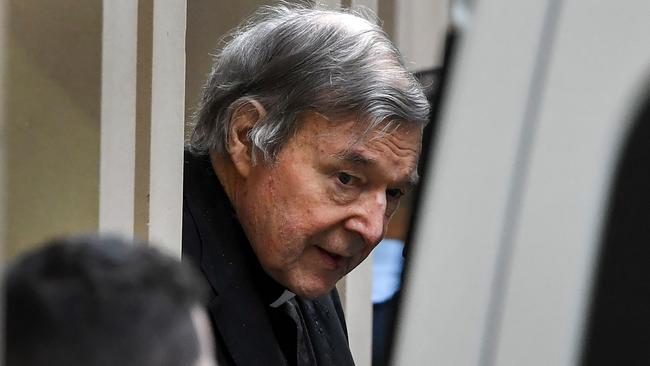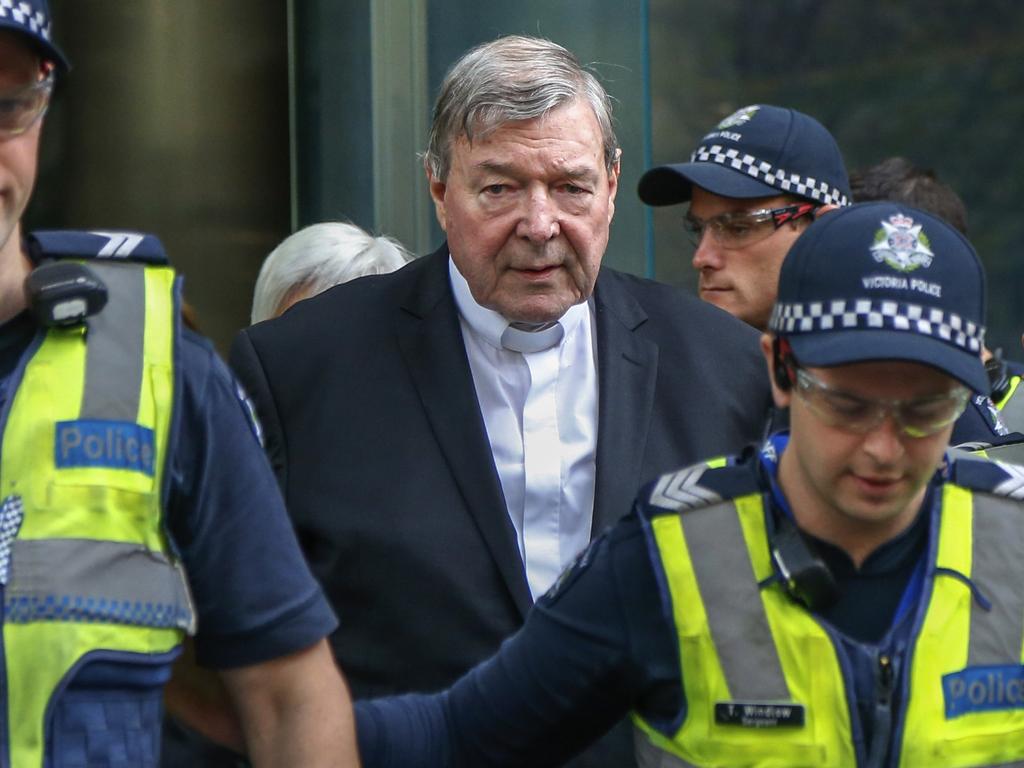The Pell appeal: judges’ finding ‘reversed onus of proof’
George Pell’s lawyers say he was asked to prove the impossible by two appeal court judges.

George Pell’s lawyers say the fallen cardinal was asked to prove the impossible by two appeal court judges.
His high-powered legal team lodged a High Court challenge on Tuesday to his conviction, arguing that Victoria’s Court of Appeal mistakenly reversed the onus of proof when hearing his case, forcing him to prove it was impossible for him to sexually assault two choirboys in a cathedral.
In their application, Pell’s barristers Bret Walker SC and Ruth Shann said the two judges in Victoria’s Court of Appeal who upheld Pell’s convictions “erred by finding their belief in the complainant required (Pell) to establish the offending was impossible in order to raise and leave a doubt”.
MORE: Chris Merritt writes it does look as though George Pell has been the victim of a shocking miscarriage of justice
They further argued that there was reasonable doubt about the existence of an opportunity for the attack to have occurred.
Pell was found guilty by a jury last year of sex offences against two teenage choirboys at St Patrick’s Cathedral after Solemn Mass in Melbourne in 1996 while he was archbishop.
One of the former choirboys gave evidence at Pell’s trials; the other died in 2014 from a drug overdose, which his family says was linked to post-traumatic stress disorder from the abuse.
Pell’s appeal to the Victorian Court of Appeal was rejected last month in a 2-1 majority decision.
Chief judge Anne Ferguson and the president of the court Chris Maxwell found the surviving choirboy and complainant in the case was a truthful witness and the conviction should stand.
But judge Mark Weinberg found the complainant embellished his account at times and argued that Pell should be acquitted.
Pell’s legal team had 28 days after the Victorian Court of Appeal judgment to lodge a High Court appeal, and they filed it with one day to spare.
Lawyers for the father of the deceased boy said their client was “beyond disappointed” that Pell had taken the fight further.
“This painful period of his life is simply not coming to an end, which continues to take a toll on his health,” they said. “Every time Pell takes his legal fight to the next level, our client is reminded of the disgusting abuse he inflicted on his son as a young choirboy.”
Pell remains in the Melbourne Assessment Prison. There is no guarantee the High Court will hear his case; that decision will be made by a panel of two or three judges in a special leave hearing.
In their appeal application, Pell’s legal team claim Justices Ferguson and Maxwell, referred to as the majority, examined each piece of evidence in isolation to determine whether the jury should doubt the allegations. The lawyers claim this was an error in approach that “infected” the treatment of the body of evidence, which contradicted the choirboy’s account.
“Though the majority said … that there was no onus on (Pell) to prove impossibility that is precisely what their analysis required him to do,” the application states.
They argued that the approach taken by the majority judges required Pell to “establish actual innocence”, rather than “merely pointing to doubt”.
“This was a reversal of the onus and standard of proof. Rigid application of the onus and standard of proof in 21st-century sexual assault trials in Australia is of particular importance.’’
The application states Australian parliaments have modified laws of evidence and procedure over the past 20 years with the effect of “making it more difficult to test allegations of sexual assault”.
“Those who are accused, including by a complete stranger making decades-old allegations, cannot, for example, investigate a complainant’s psychological history in the hope of uncovering a reason why a seemingly credible person is accusing them of offending they say they did not commit.”
The application highlighted that the surviving complainant had received “psychological treatment” and that Pell’s team was not able to tell the jury this or obtain records of it.
Pell’s team argued that the application of correct judicial method by Justices Ferguson and Maxwell would have led to acquittal. “The majority’s erroneous judicial method prevented them from recognising that, even on their own incomplete analysis of the evidence, doubt was raised and left.’’
Pell’s team said it was common ground that Pell and the two boys would have needed to be alone in the priests’ sacristy for five to six minutes, for the forced oral sex and masturbation to occur.
The evidence presented was that the area around the sacristy was a “hive of activity’’ after every Sunday Solemn Mass.
The prosecution case, Pell’s lawyers said, was that the two boys were in an external procession before breaking off, entering the south transept, walking to the sacristy, and then drinking altar wine before being caught by Pell and the start of the five to six minutes. “The majority concluded that if any of the evidence showed impossibility, in one respect or another, then the jury must have had a doubt,” they say.
“The facts as found by (Justices Ferguson and Maxwell) were that the only time when the room was empty for five to six minutes was a time when the complainant and the other boy, on the crown’s case, were not in the room.
“Thus, according to this aspect of the majority’s own approach, the verdicts were impossible.”
Justice Weinberg’s dissenting judgment should be accepted as a correct interpretation of the evidence, Pell’s lawyers argue, saying that an inability to find the complainant a liar didn’t determine proof beyond reasonable doubt.
“Belief in the complainant is the beginning of the inquiry, not the end,” they said. “Belief is a prerequisite to conviction but belief does not preclude the existence of doubt raised and left by other cogent evidence.
“To find otherwise would fundamentally alter the burden and standard of proof in a criminal trial and increase the likelihood of miscarriages of justice.”
Pell is serving a minimum three years and eight months’ jail, with a headline penalty of six years.
He did not give evidence at his criminal trial but denied the abuse when interviewed by police in Rome. He was Australia’s highest-ranked Catholic and was considered to be the third-most senior figure in the Vatican before the abuse charges were laid.



